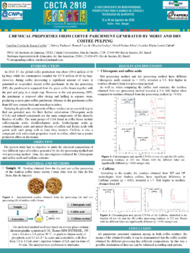Chemical properties from coffee parchment generated by moist and dry coffee pulping.
Chemical properties from coffee parchment generated by moist and dry coffee pulping.
Author(s): COELHO, C. C. de S.; PACHECO, S.; GODOY, R. L. de O.; FREITAS-SILVA, O.; CABRAL, L. M. C.
Summary: Coffee cultivation gives rise to a high volume of waste. A more detailed study of these residues would make it possible to determine the potential use of it and to suggest an appropriate destination. The present study aims to study the composition of two different types of residues, named coffee parchment, generated by the wet and dry coffee processing. It was analyzed the determination of chlorogenic acid, caffeic acid and caffeine content by High Performance Liquid Chromatograph. According to the results, chlorogenic acids content ranged from 0.116 by wet process residues to 0.021 g/100g by dry processes residues, revealed a 5.5- fold higher in residues obtained from wet processing method. In relation the caffeic acid contents, the residues obtained from wet processing method revealed a 2.4- fold higher (0.012 ± 0.001 g/100g) when compared to residues obtained from dry processing method (0.005 g/100g). However, to Caffeine content revealed a 1.7- fold higher in residues obtained from dry processing method (0.381 ± 0.007 g/100g). By means of the obtained results, it can be demonstrated that the coffee residue obtained by different processing has different compositions, the results of this research show the importance of characterizing abundant residues as an essential step to find out potential uses for their further valorization.
Publication year: 2018
Types of publication: Abstract in annals or event proceedings
Unit: Embrapa Food Technology
Keywords: Tecnologia de Alimento
Observation
Some of Embrapa's publications are published as ePub files. To read them, use or download one of the following free software options to your computer or mobile device. Android: Google Play Books; IOS: iBooks; Windows and Linux: Calibre.
Access other publications
Access the Agricultural Research Database (BDPA) to consult Embrapa's full library collection and records.
Visit Embrapa Bookstore to purchase books and other publications sold by Embrapa.

